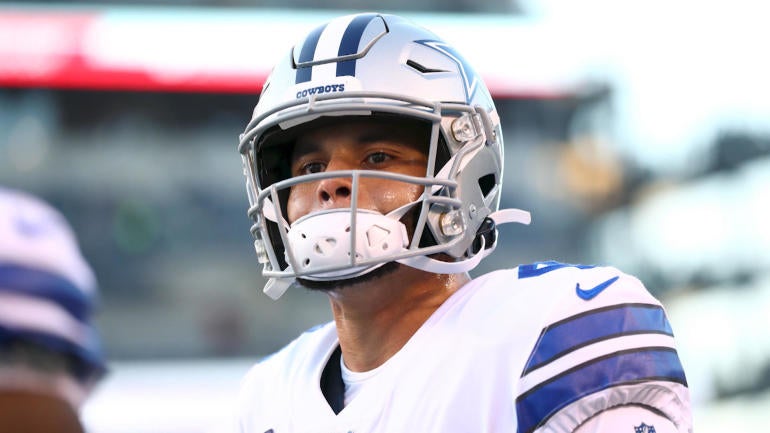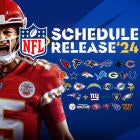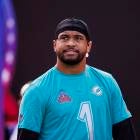
The Cowboys and quarterback Dak Prescott were unable to reach an agreement on a long-term contract before Wednesday's 4 p.m. ET deadline for franchise players to sign multi-year deals. Prescott, who was designated as an exclusive franchise player, will play the 2020 season for a fully guaranteed $31.409 million.
A last-ditch effort to strike a deal as the deadline approached was made. After months of a contract stalemate, the final five-year offer averaged between $33 million and $35 million per year with $110 million in guarantees, of which $50 million was a signing bonus, according to NFL Network's Jane Slater. The first two contract years in the offer were for $70 million. Previous reports about the negotiations did not have as much specificity about what Dallas had put on the table but pegged the offer in the $35 million per year neighborhood.
Here are some frequently asked questions relating to Prescott's situation.
Why wasn't a deal done?
The biggest sticking point was the length of the contract. The Cowboys were insistent on a five-year deal, while Prescott only wanted to sign for four years.
Prescott wanted the four-year deal to be better positioned to take advantage of the NFL's anticipated financial growth in the coming years. The salary cap is expected to increase significantly with the addition of a 17th regular season game and new media rights deals. Most of the current TV deals expire after the 2022 season. The 17th game most likely will be implemented at some point before the 2023 season.
Prior to the blockbuster 10-year, $450 million contract extension (worth up to $500 million through incentives) Patrick Mahomes signed with the Chiefs last week, the trend had been for high-end quarterbacks deals to be shorter than what Dallas would have preferred. There are seven quarterbacks besides Mahomes with contracts averaging $30 million or more per year. Falcons signal caller Matt Ryan is the only one of these seven whose deal contains more than four new contract years, as he signed a five-year contract extension. The average length for these seven quarterback deals is 3.57 new years. Since all seven deals were extensions (where they had at least one year remaining on their existing deals when signed), the quarterbacks are under contract for an average of five total years.
Both sides were essentially playing a high-stakes game of chicken to see who would blink first. Neither side blinked.
How common is it for QBs to play on franchise tags?
It's unusual. Quarterbacks have only played on franchise tags three times in the 21st century. Drew Brees was the first in 2005 with the Chargers. Kirk Cousins played under franchise tags with the Washington franchise in 2016 and 2017.
When can the Cowboys sign Prescott long-term?
The Cowboys are prohibited from signing Prescott to a multi-year contract until the end of the 2020 regular season on January 3, 2021. Prescott said all of the right things after the deadline passed. He expressed happiness that he is a member of the Cowboys and is focused on trying to win a Super Bowl in comments to USA Today Sports.
What's Prescott's status after the season?
Prescott will become an unrestricted free agent next offseason provided he isn't given a second franchise tag in 2021 for $37,690,800 at a CBA-mandated 20 percent raise. A transition tag would be at the same amount as the franchise tag but would only provide the Cowboys with a right to match an offer sheet from another team.
Can the Cowboys still trade Prescott?
Prescott can be dealt to another team until the 2020 season trading deadline at 4 p.m. ET on November 3. A team must have enough salary cap room to absorb Prescott's current salary of $31.409 million in order to make a trade before the beginning of the regular season. During the season, a team must have the cap room to take on the prorated amount of Prescott's salary. For example, a team acquiring Prescott four weeks into the season must have $24,018,647 of cap room available for 13/17ths of his franchise tag. The prohibition on signing a long-term deal until the season ends also applies to the new team with a trade. Practically speaking, a Prescott trade isn't going to happen.
Could Prescott hold out?
Holding out would be pointless and expensive. Prescott signed his $31.409 million franchise tender about three weeks ago and can't sign long term until January 2021 at the earliest anyway. Since Prescott has signed, he is contractually obligated to perform services once training camp starts. Prescott would be subject to a mandatory fine of $50,000 for each day of training camp he missed because he is under contract.
How likely is a second franchise tag in 2021?
Barring a serious injury or major regression by Prescott this season, the expectation is Dallas will designate Prescott as an exclusive franchise player again in 2021. The Cowboys getting a deal done with Prescott before the end of the designation period next March would be surprising. Prescott would have little incentive to sign before the Cowboys had to decide whether to let him become a free agent.
A second franchise tag would be harder for the Cowboys to handle from a salary cap standpoint. Prescott's current tag is 15.85 percent of the league-wide $198.2 million salary cap. League revenues are expected to drop because of the COVID-19 pandemic and have an impact on the 2021 salary cap due to games potentially being played in empty stadiums or in front of limited fans. At best, the salary cap will likely remain flat provided the NFL and NFLPA agree to spread out 2020 revenue losses over multiple league years. Prescott's 2021 tag would be 19.02 percent of the salary cap with it remaining at $198.2 million next year.
Dallas already has nearly $177 million in 2021 salary cap commitments without signing any of the players that were selected in the 2020 NFL Draft, which would increase the number. In order to accommodate a second Prescott franchise tag next year, Dallas will need to restructure contracts to create salary cap room, negotiate pay cuts with contracted players and/or release some players.
What happens if Prescott gets hurt this season?
Prescott getting another franchise tag becomes unlikely depending on the severity of the injury. The kind of contract offers Prescott rejected may not be available from Dallas or any other team in free agency next offseason.
Brees suffered at a career-threatening shoulder injury at the end of the 2005 season while playing with the Chargers on a franchise tag. Despite the nature and timing of the injury, Brees signed a six-year, $60 million contract with the Saints as an unrestricted free agent in 2006. That was second-tier quarterback money at the time. Brees had only been named to one Pro Bowl in five NFL seasons when he signed with the Saints. Concussion issues would probably be more problematic for Prescott than a shoulder injury like the one Brees had.
How would a second franchise tag impact negotiations?
Generally, the longer a team waits to sign a Pro Bowl caliber player, the more costly it is. Any offers discussed in this year's negotiations will likely be considered obsolete by Todd France, Dak Prescott's agent, because his client would have successfully incurred the risk of injury and poor performance again to get franchised for a second straight year. The cost of franchising Prescott a second time in 2021 should become the starting point for serious negotiations to France.
That's what happened with defensive end Demarcus Lawrence when he was designated a franchise player for a second consecutive time in 2019. Lawrence's franchise number was $20,571,600. He signed a five-year, $105 million contract averaging $21 million per year with $65 million in guarantees, where $48 million was fully guaranteed at signing.
If representing Prescott, I would be adamant about only signing a three-year deal after getting another franchise tag. My position would be Prescott wanted to sign for four years once his rookie contract expired. Insisting on a three-year deal after playing under a franchise tag this year would be consistent with this thinking.
Dallas also runs the risk of Prescott playing the franchise tag game like Cousins did. By all accounts, Prescott wants to remain in Dallas long-term. Cousins wanted to stay with Washington initially after his rookie contract expired. My understanding is Cousins' camp didn't have much interest in engaging in serious negotiations at some point after receiving a second franchise tag in 2017.
Cousins embracing the franchise tag during the 2016 and 2017 seasons led to him breaking new ground by getting the NFL's first lucrative fully-guaranteed veteran contract in 2018 free agency. He signed a three-year, $84 million deal (worth a maximum of $90 million through incentives) with the Vikings, which at the time made him the league's highest-paid player. The contract also contained a no-trade clause and language preventing Minnesota from designating Cousins as a transition player. Minnesota's tight salary cap and the way Cousins' contract was structured created leverage for him to get a new deal this offseason. He signed a two-year, $66 million extension creating just over $10 million of much needed cap relief for the Vikings.
Cousins will have made $128,396,600 since first franchised in 2016 through the 2020 season. Seahawks quarterback Russell Wilson at $128.442 million is the only NFL player who is going to make more money than Cousins during this span. Cousins will also receive $10 million of the $30 million signing bonus in this offseason's extension at the end of next March, which was not included in these calculations.
Dallas would have a decision to make in 2022 if Prescott has played on two straight franchise tags. A third and final franchise tag in 2022 with a 44 percent increase over the 2021 figure would be $54,274,752. If Dallas passed on a third franchise tag, the likely result would be free agency in 2022 for Prescott, although he could be designated as a transition player with a 20 percent raise from his 2021 number, which would be $45,228,960. Prescott would stand to make just under $123.75 million from 2020 through 2022 on three franchise tags.





















